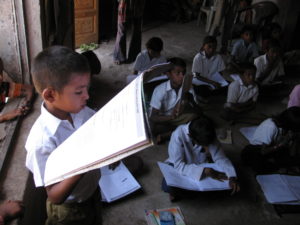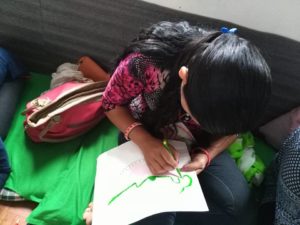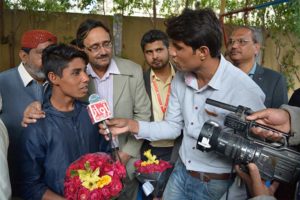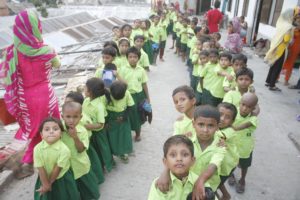Opportunity Through Literacy in Rural India
LeapForWord / Pune, India
 Born and raised in suburban Mumbai to parents who worked multiple jobs to provide for the family, Pranil Naik understood early on the importance of education as a way to break out of poverty. This understanding encouraged him to start LeapForWord (LFW), an innovative community-based organization that provides access to English language learning for rural children – thereby opening doors to success in school, work, and life.
Born and raised in suburban Mumbai to parents who worked multiple jobs to provide for the family, Pranil Naik understood early on the importance of education as a way to break out of poverty. This understanding encouraged him to start LeapForWord (LFW), an innovative community-based organization that provides access to English language learning for rural children – thereby opening doors to success in school, work, and life.
In India, employment and educational advancement are strongly linked to English fluency. Yet children in rural India have little opportunity to hear, speak, or practice English. Recognizing this disparity, LFW offers English language instruction in rural schools and at its own learning centers. LFW also trains older youth to become community English teachers.
Using this simple yet effective model, LFW is dismantling the inherent inequality in the education system. And by training youth with English skills to teach younger children, the organization is simultaneously presenting a route to economic empowerment and creating a new workforce.
Without the support of LeapForWord and GFC, these children would struggle to get the education they need to break out of poverty. This kind of effective, locally led work aligns wholly with our commitment to fueling grassroots innovation in India and around the world.
Compassionate Care for Trafficking Survivors in Nepal
Center for Awareness Promotion / Kathmandu, Nepal
Thousands of Nepali women and girls are trafficked each year, either domestically or across the border into India. Coerced into commercial sex or forced labor, the majority of trafficking victims come from disadvantaged communities and extremely poor families.
 Sadly, even after girls are rescued from sexual exploitation, they face numerous challenges as they struggle to reintegrate into society.
Sadly, even after girls are rescued from sexual exploitation, they face numerous challenges as they struggle to reintegrate into society.
But with help from the Center for Awareness Promotion (CAP), young trafficking survivors can regain their rights and rebuild their lives. CAP rescues and rehabilitates girls and young women who have been trafficked or sexually exploited in the adult entertainment industry in Kathmandu. Many of the girls have been forced to work in massage parlors and dance clubs; on a daily basis, they face harassment, abuse, and stigmatization.
CAP runs a mobile counseling unit, reaching these girls where they work and equipping them with knowledge and resources in the areas of emotional and physical health, reproductive rights, and legal counseling. The mobile unit serves as an entry point for rescuing the girls and removing them from danger. Girls who transition to CAP’s shelter receive everything they need to reintegrate into society, including counseling, educational support, vocational training, and job placement services.
The massive earthquake in April 2015 exacerbated existing risks for these girls. In response, CAP developed a long-term program to support girls who lost parents in the disaster. By providing them with vocational training, CAP helps them to avoid exploitation and get on the path to a safe and healthy adulthood.
Rapid Rescue for Missing Children in Pakistan
Roshni Research and Development Welfare Organization / Karachi, Pakistan
When children go missing, the first 48 hours are crucial: as time goes on, the chance of recovery drops, and the risk of exploitation and abuse increases. Missing children are very difficult to track, and those who are found often need extensive rehabilitation.
 In Pakistan, the city of Karachi is a known hub for child trafficking, so children in this community are especially at risk. Thankfully, this is where Roshni Research and Development Welfare Organization makes its home. The only organization of its kind in Pakistan, Roshni tracks down missing and trafficked children, helps them recover from trauma, and reunites them with their families.
In Pakistan, the city of Karachi is a known hub for child trafficking, so children in this community are especially at risk. Thankfully, this is where Roshni Research and Development Welfare Organization makes its home. The only organization of its kind in Pakistan, Roshni tracks down missing and trafficked children, helps them recover from trauma, and reunites them with their families.
Focused on recovering missing children in the first 48 hours after their disappearance, the Roshni Helpline is a unique quick-response mechanism that facilitates neighborhood early warning systems – engaging police, hospitals and health clinics, hotels, and community groups. Helpline staff work with the missing child’s family and neighbors to collect information on the child, then distribute this information through its networks, local media, and neighborhood channels. Once a child is recovered, Roshni helps families reunite and coordinates the child’s physical and psychological rehabilitation.
Roshni also builds the capacity of communities to protect children and more quickly recover missing children, advocates for better laws and policies to address this neglected but critical issue, and raises awareness about child protection through its advocacy work.
And that’s not all: Roshni is rapidly expanding its impact in Pakistan – and beyond the country’s borders. The organization has recently established three new offices in northwestern Pakistan to curb child trafficking from northern Pakistan and Afghanistan (the two main sources of child trafficking) to the rest of the country. Thanks to GFC’s networking opportunities, Roshni connected with several GFC grassroots partners based in Nepal. These organizations are now preparing to formalize partnerships to replicate Roshni’s strategy for recovering and rehabilitating children in Nepal.
In Bangladesh, Helping Kids Go to School – Instead of to Work
Alor Pothe Nobojatray Foundation / Dhaka, Bangladesh
In Bangladesh, millions of children are engaged in child labor, and only 25% of working children are in school. Although primary education in Bangladesh is free for all children, it is seldom available to children living in slums, since many families rely on income generated by their children for survival. These children work up to 12 hours a day, picking trash, working in factories, or selling goods to earn a living.
 Through multiple education centers across Dhaka, Alor Pothe Nobojatray Foundation (APON) helps working children break the cycle of poverty. Most of the children who attend classes at these education centers work long hours and earn less than a dollar a day. Because they are working most of the time, traditional schools are not an option. And since their earnings contribute substantially to their family’s monthly income, they cannot put school first. So APON meets children where they are—on the streets, at odd hours—with the goal of eventually enrolling them in mainstream schools.
Through multiple education centers across Dhaka, Alor Pothe Nobojatray Foundation (APON) helps working children break the cycle of poverty. Most of the children who attend classes at these education centers work long hours and earn less than a dollar a day. Because they are working most of the time, traditional schools are not an option. And since their earnings contribute substantially to their family’s monthly income, they cannot put school first. So APON meets children where they are—on the streets, at odd hours—with the goal of eventually enrolling them in mainstream schools.
At its centers, which are located in neighborhoods with high concentrations of working children, APON offers classes in English, Bangla, and math four days a week for two hours a day. The organization also incorporates health and hygiene information into its education program and provides nutritious meals to the children once a week.
When the children are ready, APON helps them enroll in the government educational system or connects them with vocational training. The organization also supports the children’s families by providing small loans and linking the families to other services—thereby allowing them to send their children to school and open doors to a brighter future.